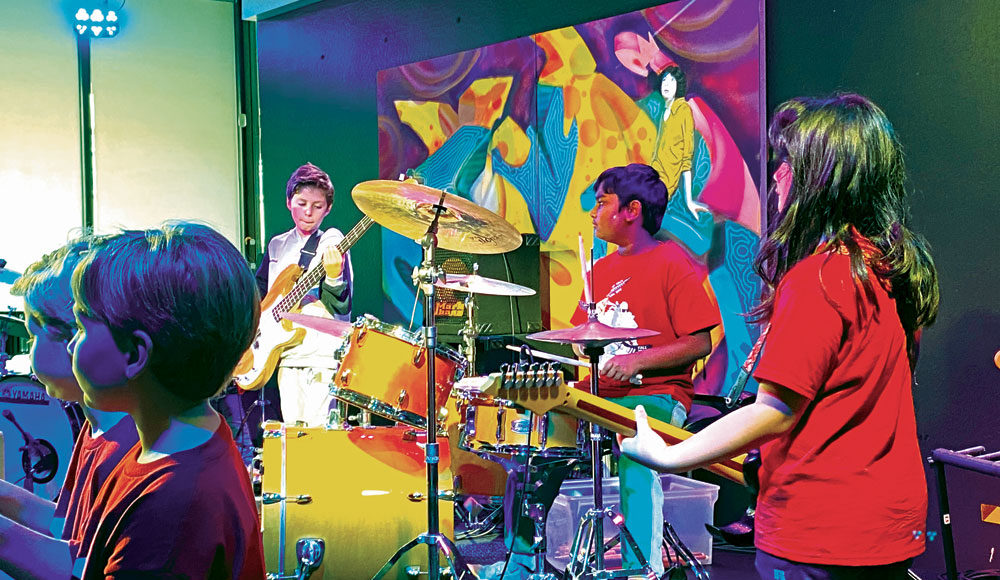There will be Riot Grrrl tunes, arena rock and one-hit wonders. Even KISS covers. All performed by kids.
Coming up this month, School of Rock San Jose will take over the SoFA District with three gigs. The adult students will play all night at Mama Kin on May 18. Then two simultaneous concerts by youth students will unfold the next day, all day, at the San Jose Jazz Break Room and San Jose Stage Company.
With more than 350 locations throughout the world, School of Rock teaches guitar, bass, keys, drums and vocals to kids via its patented music education program that combines one-on-one lessons with group practices. As a result, kids get out of their rooms and into bands and then get to perform in front of real audiences. They come away prepared for the studios and the stages.
The San Jose location on Almaden Expressway opened just over ten years ago in a former Computerland store across the parking lot from Britannia Arms. It now has more than 400 students.
Last week I caught up with San Jose School of Rock Music Director Eric Hayslett, who spoke over the wires from Nashville, where he was attending the School of Rock Overdrive Conference. Even while stoked to gather in Music City with a passionate School of Rock community and plot the future, Hayslett was already looking forward to San Jose’s season-ending run of gigs in the SoFA District.
“We’re a growing, passionate community that is enriching lives through performance-based music education,” he said. “We’re getting kids outside of the classroom, not just individual lessons, not just recitals. We’re getting them ready to perform. We’re getting them amongst other kids, getting them to play, getting them to grow together, experience other kids or even adults.”
Elaborating, Hayslett said the program helps kids break away from their phone attachments and their isolation. Sometimes they overcome anxiety problems. They learn how to collaborate and listen to other people with no criticism, bullying or ego jockeying involved.
“We give them the opportunity to get up and perform, as opposed to just sitting around playing in their living room or their garage or their own rooms,” Hayslett said. “We give them an opportunity to hit the stage and we try to provide nice venues for them to play. And it is amazing.”
A season consists of kids signing up for various sets—KISS tunes, R&B, New Orleans music, oldies, hair metal or what have you—and rehearsing the numbers for several weeks. Then everyone gets together for the shows, which unfold on real stages.
Just last January, I was one of 1,200 people that shuffled through the San Jose Jazz Break Room over the course of a weekend to see dozens and dozens of kids. South Asian parents, Chinese and Korean families, people of every ethnicity all gathered around or packed the place for various themed sets. It was indeed amazing.
I did not witness the set of kids doing Rush covers, but apparently they nailed it. Some of those songs are complicated.
“A lot of kids signed up for Rush,” Hayslett said. “And when we let ’em know what shows are available, we also let ’em know, ‘Hey, this is not a lightweight show. Don’t attempt to sign up if you know you can’t play Rush songs.’ Because we’re not going to water them down.”
As we continued our discussion, Hayslett and I both agreed that School of Rock is a great social experiment that provides a safe environment for kids to collaborate, learn and grow together. Sometimes it creates lifelong relationships.
In other words, kids learn not only how to be better musicians, but how to be better people. They are encouraged not to belittle others in the band or make fun of someone else’s playing.
“We encourage the kids to not talk down to each other,” Hayslett said. “We have a certain way of doing it to where we’re not tearing anyone down. We’re there to lift each other up.”
Apparently it’s working. As of last January, School of Rock claimed 282 domestic schools and 77 international schools spanning 15 markets, with hundreds of locations still under development. Long live rock ’n’ roll.



